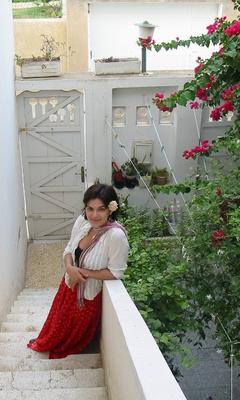Law and Human Rights in Tunisia
Besides the refreshing change of palate, the other exciting thing about dinner at the Pakistani restaurant was that I got to meet some Tunisian law students. They spoke wonderful English, and I got to ask a lot of questions about the Tunisian legal culture, and politics.
 It turns out that Tunisia is a civil law country, rather than a common-law one, although these days students here study both systems so they can understand the international environment. So, the courts here don’t really adjudicate constitutional rights so much. In theory it’s the legislature’s job to protect rights, but in practice Tunisia has a very strongly presidential “democracy,” and whatever President-for-Life Ben Ali says goes.
It turns out that Tunisia is a civil law country, rather than a common-law one, although these days students here study both systems so they can understand the international environment. So, the courts here don’t really adjudicate constitutional rights so much. In theory it’s the legislature’s job to protect rights, but in practice Tunisia has a very strongly presidential “democracy,” and whatever President-for-Life Ben Ali says goes.
Also, the criminal justice system does not involve trial by jury, but rather by a judge, with three levels of mandatory review to root out error or bias. The two students were divided on how this system compares to the American one of trial before a jury of your peers. Both agreed that there is a greater potential for abuse in politically-motivated prosecutions. However, one of the law students felt strongly that for the average criminal defendant without the resources to afford a great lawyer, the Tunisian system ends up being fairer. Because there is no jury, it is the judge’s responsibility to find out the truth. Whereas in the U.S. adversarial system of justice, the judge is supposed to sit back and let the advocates from each side to present their cases, and let the jury decide. Thus so much depends on how good your lawyer is. He cited O.J. Simpson as an example of how money can cheat the system, and the high rates of incarceration of people of color as what happens to people who can’t afford good lawyers. However, the other law student thought the idea of a jury of your peers was fairer, because there is a greater number of people reviewing your case, not just one judge or three judges.
I told them that I wanted to go into human rights law, and we talked about that for a while. They were familiar with Human Rights Watch and their work in Tunisia, and it sounds like they have a pretty good reputation.
 It turns out that Tunisia is a civil law country, rather than a common-law one, although these days students here study both systems so they can understand the international environment. So, the courts here don’t really adjudicate constitutional rights so much. In theory it’s the legislature’s job to protect rights, but in practice Tunisia has a very strongly presidential “democracy,” and whatever President-for-Life Ben Ali says goes.
It turns out that Tunisia is a civil law country, rather than a common-law one, although these days students here study both systems so they can understand the international environment. So, the courts here don’t really adjudicate constitutional rights so much. In theory it’s the legislature’s job to protect rights, but in practice Tunisia has a very strongly presidential “democracy,” and whatever President-for-Life Ben Ali says goes. Also, the criminal justice system does not involve trial by jury, but rather by a judge, with three levels of mandatory review to root out error or bias. The two students were divided on how this system compares to the American one of trial before a jury of your peers. Both agreed that there is a greater potential for abuse in politically-motivated prosecutions. However, one of the law students felt strongly that for the average criminal defendant without the resources to afford a great lawyer, the Tunisian system ends up being fairer. Because there is no jury, it is the judge’s responsibility to find out the truth. Whereas in the U.S. adversarial system of justice, the judge is supposed to sit back and let the advocates from each side to present their cases, and let the jury decide. Thus so much depends on how good your lawyer is. He cited O.J. Simpson as an example of how money can cheat the system, and the high rates of incarceration of people of color as what happens to people who can’t afford good lawyers. However, the other law student thought the idea of a jury of your peers was fairer, because there is a greater number of people reviewing your case, not just one judge or three judges.
I told them that I wanted to go into human rights law, and we talked about that for a while. They were familiar with Human Rights Watch and their work in Tunisia, and it sounds like they have a pretty good reputation.


1 Comments:
Was that lesson not to let the Americans sell arms to local rebel groups?
Post a Comment
<< Home